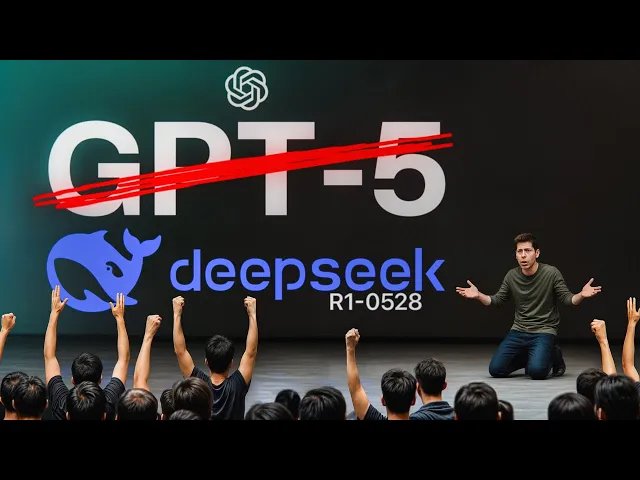Goodbye GPT-5… New DeepSeek Update is HERE! AI News EXPLAINED

The rise of DeepSeek and the "model wars"
The artificial intelligence landscape continues to evolve at a breakneck pace, with new models challenging established players in unexpected ways. In a recent video, the host explores DeepSeek's latest advancements and what they mean for the broader AI ecosystem, particularly in relation to OpenAI's GPT models. The emergence of DeepSeek represents yet another shift in what's becoming an increasingly competitive field where technical capabilities, open-source philosophy, and business strategy collide.
Key points from the video:
-
DeepSeek has released a powerful new model that demonstrates remarkable capabilities in coding, reasoning, and mathematics, positioning it as a serious competitor to GPT-4 and potentially GPT-5.
-
Unlike OpenAI's closed approach, DeepSeek offers both fully open-source options and commercial API access, giving developers and businesses more flexibility in how they implement AI solutions.
-
The performance benchmarks suggest DeepSeek is outperforming many established models in specific domains, particularly in coding and mathematical reasoning tasks.
The shifting AI landscape
The most striking takeaway from this development is how rapidly the competitive dynamics in AI are changing. Just months ago, the conversation was dominated by OpenAI, Anthropic, and Google. Now, companies like DeepSeek are demonstrating that innovation can come from unexpected places, and that the barriers to creating state-of-the-art AI systems are lowering.
This matters tremendously for the industry because it suggests we're entering a period where AI capabilities may become more commoditized. When multiple providers can offer similar technical capabilities, competition shifts to other factors: pricing, openness, specialization, and integration. For businesses planning their AI strategy, this means more options but also more complex decision-making about which platforms to invest in.
The open-source advantage
DeepSeek's dual approach—offering both open-source and commercial options—represents a business model that OpenAI has thus far avoided. This hybrid strategy deserves more attention than it receives in most coverage. Companies that embrace open source while finding sustainable business models often create unique advantages in developer adoption and ecosystem growth.
Consider MongoDB, which built a billion-dollar business on open-source foundations while adding premium features for enterprise customers. Their open-source approach helped them buil
Recent Videos
How To Earn MONEY With Images (No Bullsh*t)
Smart earnings from your image collection In today's digital economy, passive income streams have become increasingly accessible to creators with various skill sets. A recent YouTube video cuts through the hype to explore legitimate ways photographers, designers, and even casual smartphone users can monetize their image collections. The strategies outlined don't rely on unrealistic promises or complicated schemes—instead, they focus on established marketplaces with proven revenue potential for image creators. Key Points Stock photography platforms like Shutterstock, Adobe Stock, and Getty Images remain viable income sources when you understand their specific requirements and optimize your submissions accordingly. Specialized marketplaces focusing...
Oct 3, 2025New SHAPE SHIFTING AI Robot Is Freaking People Out
Liquid robots will change everything In the quiet labs of Carnegie Mellon University, scientists have created something that feels plucked from science fiction—a magnetic slime robot that can transform between liquid and solid states, slipping through tight spaces before reassembling on the other side. This technology, showcased in a recent YouTube video, represents a significant leap beyond traditional robotics into a realm where machines mimic not just animal movements, but their fundamental physical properties. While the internet might be buzzing with dystopian concerns about "shape-shifting terminators," the reality offers far more promising applications that could revolutionize medicine, rescue operations, and...
Oct 3, 2025How To Do Homeless AI Tiktok Trend (Tiktok Homeless AI Tutorial)
AI homeless trend raises ethical concerns In an era where social media trends evolve faster than we can comprehend them, TikTok's "homeless AI" trend has sparked both creative engagement and serious ethical questions. The trend, which involves using AI to transform ordinary photos into images depicting homelessness, has rapidly gained traction across the platform, with creators eagerly jumping on board to showcase their digital transformations. While the technical process is relatively straightforward, the implications of digitally "becoming homeless" for entertainment deserve careful consideration. The video tutorial provides a step-by-step guide on creating these AI-generated images, explaining how users can transform...
